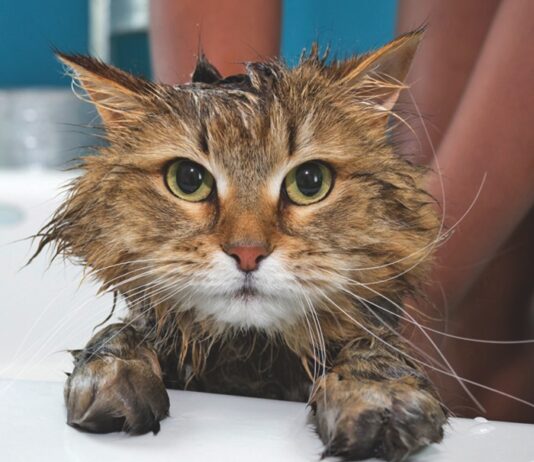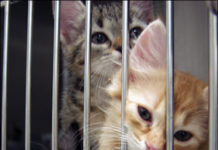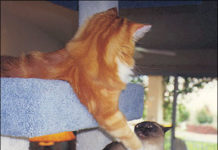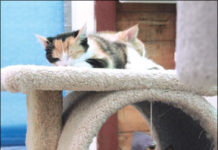Teaching Your Old Cat New Tricks
We have all heard the popular phrases that support the notion that cats cannot be trained. Tee shirts remind us that "dogs come when called - while cats take a message and get back to us." When a dog is not particularly obedient, he is said to be "more like a cat than a dog." Yet we all know that cats are intelligent and quite capable of learning. In fact, people have successfully trained fruitflies and fish. Perhaps the misconception arose because old-fashioned training strategies which rely on coersion are generally ineffective when used on cats. On the other hand, reward-based training methods are both effective and fun. When an animal (even a cat) is rewarded for demonstrating a particular behavior, he will repeat the behavior in the future. That is the principle of positive reinforcement. A reward-based training technique requires that you find a reinforcer that is truly rewarding. What is your cats pleasure? Is there a treat so delectable that your cat would be willing to jump through a hoop, literally, just for a taste? Consider not only commercial cat treats, but fresh food instead. Morsels of meat, fish, cheese or even cantaloupe can be tested as potential reinforcers.
Ask Elizabeth: 12/08
I do believe that CatWatch readers are the most kind-hearted souls on earth! Thank you for wanting to help these little creatures. Its very common for female cats to bring home prey. Mother cats will first bring home dead animals to their young kittens, teaching them to eat prey animals. When the kittens are a bit older, the moms will bring home wounded animals, and will show the youngsters how to kill. Its possible that Marley is attempting to teach you how to hunt. The best thing that you can do when presented with an injured wild animal is to call a licensed wildlife rehabilitator for advice and assistance. Many well-meaning people are especially tempted to keep baby animals and care for them at home. Keeping wild animals - except to transport them to a wildlife rehabilitator - is against state and federal laws for lots of reasons. Many wild animals, even tiny babies, can transmit diseases to humans or other pets. Diseases, parasites or injuries may be difficult to detect and to treat, and each species requires specialized care.
A Mother’s Love?
If anyone has learned to accept the empty nest syndrome, its the mother cat who watches her kittens leave one by one by at about 12 weeks or so - either through adoption or by wandering off to fend for themselves. So its interesting to see how mother cats and their kittens behave when they stay together in the same household. "The least amount of conflict occurs with cats that have been brought up together," says Katherine A. Houpt, VMD, the James Law Professor of Animal Behavior at Cornell Universitys College of Veterinary Medicine. "Feline siblings often become friends in the household." But staying together in a small area, such as inside a home, is not the usual course of events for adolescent cats, says Dr. Houpt. Friction can occur. There may be skirmishes for social ranking among cats, especially the males. Most of these conflicts involve some threatening posturing, but usually dont result in all-out fights. Eventually, one cat will probably assume an "alpha" position in the hierarchy, while the others become content to sit on a lower rung on the social ladder and maintain the peace.
Foster a Kitten: And Save a Life
Consider this: One cat and her offspring can produce a whopping 420,000 cats in just seven years. Yikes, thats a lot of cats. Each year, from April to November, hundreds of thousands of kittens are born - often to feral or stray moms that eke out a meager existence on our city streets, in the suburbs and in rural areas across America. Without human intervention, most of these newborns will die or, at best, lead short, miserable lives. The moms that are not killed by cars, other animals or disease, will repeatedly become pregnant, adding to the already crushing pet overpopulation problem. Aside from ensuring that your own cats are spayed and neutered, consider fostering a litter of homeless kittens. Sadly, many animal shelters dont have the staff or resources available to care for kittens that are ill or too young for adoption. Newborn kittens that have lost their mom must be bottle-fed around the clock and their tiny bladders and bowels must be expressed on a regular basis. Animal shelters that have kitten foster programs in place need dedicated people who are willing to welcome kittens into their home and nurture them until they are old enough to be placed for adoption.
Is Your Aging Cat Seeking Attention?
These days, despite what we like to consider modern conveniences, people commonly complain that they just cannot find the time to get a good nights sleep. So much to do, so little time. When we finally do settle into bed, we like to be left to our dreams, undisturbed until the alarm takes us to tomorrow. Noisy neighbors, construction crews and barking dogs are beyond our control. But, what an unexpected, and unpleasant, surprise to be awakened by ones own cat! Restless behavior may be particularly hard to understand when your cat has spent the first 12 years of his life refusing to leave the covers until a decent sunbeam appears. The first time that a senior cats cries call a person from sleep, there may be a sympathetic response. A naturally concerned owner might check the food supply. The next occurrence will be more puzzling. Clearly the cat is not wanting for food. Could there be another cat in the yard? Maybe a critter got into the house?
Ask Elizabeth: 10/08
Its a sad fact of life that cats dont live nearly long enough for the humans who love them. While cloning Couscous isnt an option, I would encourage you to take lots of photos and videos of Couscous, so that these images can bring you comfort when shes no longer a part of your physical world. Take them now; dont delay, because you never know what tomorrow will bring. Afterwards, maybe you would like to do something to help other cats, in honor of Couscous. A donation to an organization aiding cats is a traditional way to honor the memory of a beloved cat (the Cornell Feline Health Center is very grateful for the many memorial gifts it receives). You could also volunteer with a local shelter or rescue group, socializing cats or taking photos of adoptable pets to put on a Web site or poster. Dropping off supplies at a shelter can make you feel like you have a direct connection to cats in need. Finally, please consider sharing your home and your heart with another cat. For sure, he or she wont be a clone of Couscous, but this unique individual will surely bring joy to your home as you discover exactly what makes him or her so special.
Short Takes: 10/08
In a recent issue of the Journal of the American Veterinary Medical Association (JAVMA Vol. 233, Number 4), the article, "Evaluation of inciting causes, alternative targets and risk factors associated with redirected aggression in cats," describes a typical case of redirected aggression like this: Your indoor cat is watching through the window. Along comes a neighborhood cat, which makes your cat really mad. Suddenly, your normally sweet pet attacks you instead. Redirected aggression is one of the most commonly reported problems to animal-behavior experts, who take the problem seriously: "Bites from aggressors are uninhibited, attacks are usually difficult to stop, and aggressors typically remain highly aroused long after the inciting event is over," according to the JAVMA report. Sometimes all it takes is a loud noise to trigger an episode of redirected (also called displaced) aggression. (For more information on cat fights, please see related article on page 3 of this issue.)
Cat Fights: What to Do?
While fighting among cats is not typical behavior, it does happen. Read on to learn some reasons why cats pick fights with each other - and what you can do about it. All kittens play, practicing to defend themselves by arching their backs, jumping on each other, chasing each other and maybe exchanging a few nips on the ears. "The difference between playing and fighting," says Katherine A. Houpt, VMD, the James Law Professor of Animal Behavior, Cornell Universitys College of Veterinary Medicine, "is that when playing, cats take turns chasing each other. There isnt one dominant aggressor or one main victim. Nobody hides." In general, cats dont play much after 16 months of age, and males are more likely to engage in play of this kind. As for fighting, cats will fight at any age. "True fighting is usually more of a one-way process," says Dr. Houpt. "One cat will be the aggressor and the other will be the victim. Hissing, clawing and batting with the paws are more fear-directed than playful. The noisier the interaction, the more likely its a fight and not play."
Help Calm Anxiety at the Vet’s Office
Isnt it remarkable that most cats are well-behaved when they visit their veterinarians? First, they are captured and put into an automobile. They remain in their containers, sheltered but helpless, in a room filled with the scent of unfamiliar cats, humans and even dogs. Finally, every bit of security is lost when the cat is removed from its newfound shelter and the veterinary team places the cat on the examination table. Why do cats behave so nicely? Fear can sometimes render a cat motionless and therefore cooperative. Fearful cats - whether immobile or aggressive - can benefit from a behavior modification specifically designed to address high arousal. But what about the average cat, dare I say the "normal" cat? There may be no indication for intensive therapy or anxiety-reducing medication. But clearly, the veterinary experience is not entirely stress-free. Rather than take a cats good behavior for granted, why not reduce some of the stressors that can occur during a visit to the veterinary hospital? Lets examine some components of the visit that could trigger anxiety.
Are Your Cats Compatible Companions?
Once upon a time, cats were considered to be solitary creatures. Since they hunted alone rather than in packs, it was assumed that they preferred to be alone. As it turns out, some cats do indeed avoid the company of others. Yet even more cats clearly choose to remain close to fellow felines. They snuggle and groom and maintain proximity even when there are plenty of comfortable, safe resting places nearby. Unfortunately, there is no reliable way to predict whether an individual kitten will mature into a cat that seeks rather than shuns companionship. When two kittens are adopted together, particularly when they are siblings, the expectation is that they will benefit from one another. Initially, most kittens do play together, groom one another and share a bed. Even as their second birthday passes, all may seem well.
Two’s Company Sometimes
Cats are naturally solitary creatures; in addition, they are also naturally independent and self-sufficient traits that we alter and/or suppress when we domesticate them. The idea of a second cat can be very alluring: "One cat is so entertaining and such a wonderful companion
two would be twice the fun!" Or, "I want to do my part to ease the burden on my local shelter and give one more cat a good home." These are common thoughts for cat owners and may, in fact, be true; however, the decision to add a second feline family member should not be taken lightly. A second cat can either add joy and companionship, or it can add strife and mayhem. Dr. Julia Albright, resident of animal behavior at Cornell Universitys College of Veterinary Medicine, states, "Cats may tolerate, but rarely enjoy the company of another cat. I see so many problems from people having too many cats, but shelters are so overcrowded with cats that I hate to deter people from providing good homes."
Two’s Company -Sometimes
Cats are naturally solitary creatures; in addition, they are also naturally independent and self-sufficient - traits that we alter and/or suppress when we domesticate them. The idea of a second cat can be very alluring: "One cat is so entertaining and such a wonderful companion … two would be twice the fun!" Or, "I want to do my part to ease the burden on my local shelter and give one more cat a good home." These are common thoughts for cat owners and may, in fact, be true; however, the decision to add a second feline family member should not be taken lightly. A second cat can either add joy and companionship, or it can add strife and mayhem. Dr. Julia Albright, resident of animal behavior at Cornell Universitys College of Veterinary Medicine, states, "Cats may tolerate, but rarely enjoy the company of another cat. I see so many problems from people having too many cats, but shelters are so overcrowded with cats that I hate to deter people from providing good homes."
















